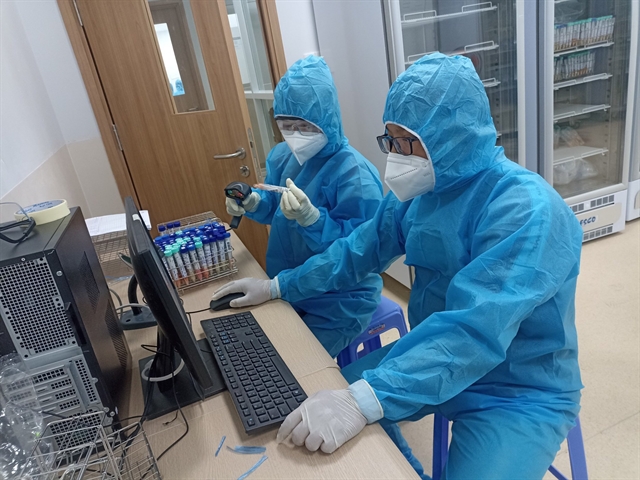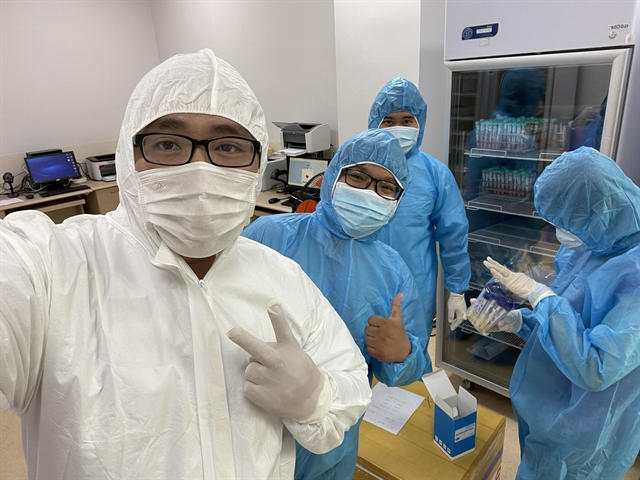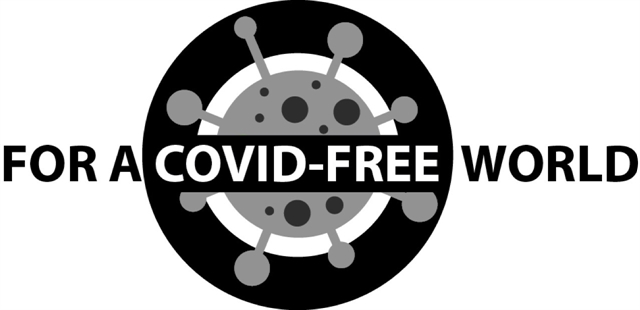 Society
Society

Lab technicians at HCM City hospitals work diligently at night to test samples for COVID-19 and provide the results as soon as possible to the city Centre for Diseases Control and Prevention to help quickly track down patients and trace their contacts to slow down transmission within the community.

|
| Lab technicians process samples at labs at the HCM City Oncology Hospital in Thủ Đức City. Photo provided by lab technician Tô Tấn Phát |
Gia Lộc
HCM CITY — Lab technicians at HCM City hospitals work diligently at night to test samples for COVID-19 and provide the results as soon as possible to the city Centre for Diseases Control and Prevention to help quickly track down patients and trace their contacts to slow down transmission within the community.
They play an important role in the fight against COVID-19; they are the unsung heroes who help contain the disease.
If they were working hard earlier, things have gotten more serious now as HCM City aims to screen 500,000 people every day until July 5 as more and more infections are detected.
Since May COVID cases have been proliferating, and lab technicians at hospitals around the city have been mobilised to help the Centre for Diseases Control and Prevention cope with the load.
Tô Tấn Phát, 28, a lab technician at An Bình Hospital in District 5, has been deputed to test samples at the Thủ Đức City branch of the HCM City Oncology Hospital, one of hospitals chosen for the task.
Every day he rides his motorbike more than 20km from his residence in District 5 to the hospital. He and his colleagues have been divided into two shifts and take turns to work nine to 12 hours a day, processing more than 10,000 samples a day on average.
When samples arrive, he and his colleagues in protective gear receive and check them. They do not accept samples that have not been refrigerated for a long time.
Then they extract the DNA from the virus, place a small bit of the swab material into a tube and insert it into a machine programmed to test for coronavirus. The machine automatically records the results in the computerised system.
Teamwork
Phát said: “We have to be very careful to avoid mistakes. Otherwise, we could accidentally certify a patient tested positive. Every result has to be exact to avoid mistakes in localising and tracing contacts. So we need to maintain great concentration while working. We co-operate closely to ensure everything done in each step of processing is correct and exact."
“We are very tired and stressed, but strive hard in the fight against COVID-19. We work in the hope the fourth wave will end soon so that life returns to normal.”
Working in a high-risk environment, Phát wears full protective clothing for long hours in hot conditions, leading to irritant contact dermatitis. Working night after night has resulted in lack of sleep, affecting his health.
“When I reach home, I head straight to the bathroom to bathe and wash my clothes with a chemical called Javel to kill pathogens. I am afraid of contracting COVID-19 and transmitting it to my parents. My father is old and has chronic conditions. So I am very careful.”
Đoàn Thị Định, a lab technician at the District 7 Hospital, has also been sent to work at the HCM City Oncology Hospital in Thủ Đức City.
After doing night shifts she sleeps during the day.
She said: “I feel happy when samples test negative for the coronavirus. But I feel sad at seeing many samples test positive. I hope the COVID-19 outbreak goes away soon.”

|
| Tô Tấn Phát, in white protective suit, and his colleague take a rest after working hard at the HCM City Oncology Hospotal in Thủ Đức City. Photo provided by lab technician Tô Tấn Phát |
At the Centre for Diseases Control and Prevention too, lab workers test thousands of samples at night so that contact tracing can begin next morning.
It has 50 people divided into three shifts of nine hours.
Since the large Gò Vấp District COVID cluster was detected on May 25, it has received 3,000-5,000 samples daily from various districts, and 1,800 more from quarantine facilities and hospitals. It has even got 30,000 samples in a day.
Ready to work on frontlines
Many lab technicians have also been mobilised to take samples from people in residential areas, industrial parks and other places to enable the city to carry out large-scale screening.
Phát and his colleagues, for instance, earlier accompanied other health officials to high-risk areas to take samples, working around the clock for this.
“We are ready to work on the frontlines in the fight against COVID-19,” he said.
Thanh Vy, a lab technician at the HCM City Oncology Hospital in Bình Thạnh District said she and her co-workers sit in protective clothing in the summer heat to take samples at the hospital and high-risk areas.
Whenever the Department of Health instructs them to take samples, they have to be present at the required location within 20 minutes, she said.
“We take samples even at midnight but still work the next day without resting.”
Their silent and unsung contribution day after day is helping the city slowly but surely overcome COVID.
A whopping 1.5 million samples have been taken from quarantine facilities, areas under lockdown, residential places, industrial parks, export processing zones, and others since May 26 when the fourth wave of the outbreak began to spread.
The city has 28 health facilities authorised by the Ministry of Health to perform COVID tests.
According to the Department of Information and Communications, research by Fulbright University and Tech4Covid showed that the outbreak peaked at the end of June and has started to fall in July.
The social distancing mandated under Directive No 10 would help control the outbreak by August, it added. VNS

|




